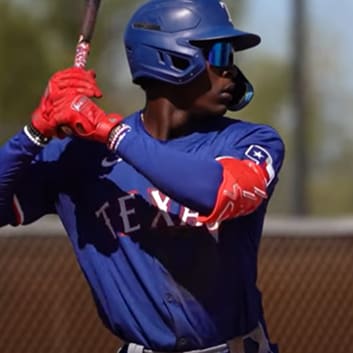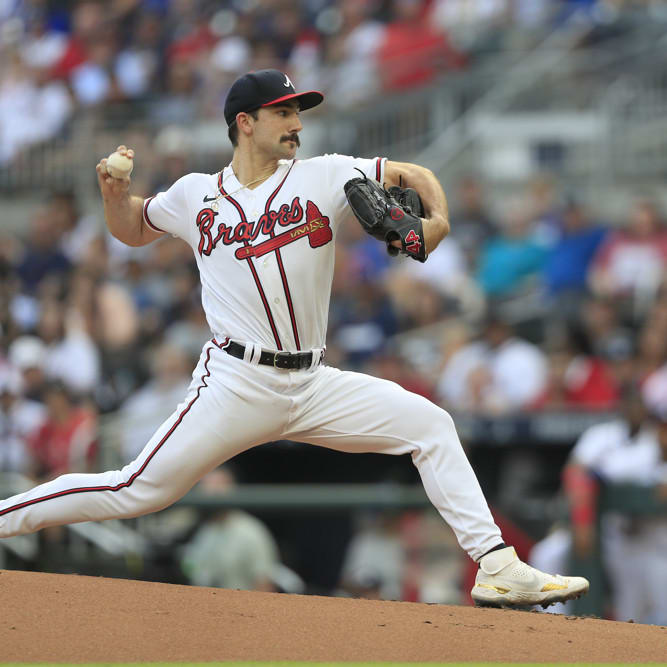Entering 2013, American League Rookie of the Year and Tampa Bay outfield Will Myers likely cost fantasy owners a pick in the early middle rounds. For a player who had never taken a MLB at bat, that draft position seemed awfully high. Still, many owners were all aboard the hype train. In the end, Myers put up impressive across-the-board numbers, hitting .293 with 13 homers, 53 RBIs and 50 runs. There was just one problem: Myers didn't play his first game in a Rays' uniform until June 18, nearly three months into the MLB season.
The rationale behind Myers' delayed promotion to the Bigs wasn't about injury. Nor was it about getting him additional season in the minors. He had crushed the lesser competition at each minor league stop, including two years in Double-A and spending a full year in Triple-A in 2012. Additionally, it wasn't as if the Rays didn't clearly have a need for his big bat in the middle of their lineup. At the time of his promotion, the Rays owned a 36-35 record. By the end of July, however, the club was 20 games over .500. No, the Rays' real motivation was a simple one. It was about money.
Normally, players must have accrued at least three years of service time on a MLB roster before they can be eligible for salary arbitration. Up until a player is eligible for arbitration, his salary is determined solely by his team, as long as it is in excess
Entering 2013, American League Rookie of the Year and Tampa Bay outfield Will Myers likely cost fantasy owners a pick in the early middle rounds. For a player who had never taken a MLB at bat, that draft position seemed awfully high. Still, many owners were all aboard the hype train. In the end, Myers put up impressive across-the-board numbers, hitting .293 with 13 homers, 53 RBIs and 50 runs. There was just one problem: Myers didn't play his first game in a Rays' uniform until June 18, nearly three months into the MLB season.
The rationale behind Myers' delayed promotion to the Bigs wasn't about injury. Nor was it about getting him additional season in the minors. He had crushed the lesser competition at each minor league stop, including two years in Double-A and spending a full year in Triple-A in 2012. Additionally, it wasn't as if the Rays didn't clearly have a need for his big bat in the middle of their lineup. At the time of his promotion, the Rays owned a 36-35 record. By the end of July, however, the club was 20 games over .500. No, the Rays' real motivation was a simple one. It was about money.
Normally, players must have accrued at least three years of service time on a MLB roster before they can be eligible for salary arbitration. Up until a player is eligible for arbitration, his salary is determined solely by his team, as long as it is in excess of MLB minimums. Once that player reaches arbitration eligibility, however, he has the option to argue his salary based on his on-field performance in front of an independent arbitration panel, which will award the player the one-year salary the panel deems most appropriate. While the player is still under team control (i.e. he cannot be a free agent) until he accrues six seasons of service time, at least the player has the power to negotiate his future contract for the first time.
A limited number of players with less than three years of MLB service time, however, qualify for MLB's special "Super Two" status, meaning they will be eligible for arbitration earlier, giving them an extra year of arbitration. Most players get three years of arbitration before they are eligible to become a free agent (assuming the player and club don't reach a long-term deal, whereby the club "buys out" the player's remaining arbitration years); Super Twos get four. In many cases, the extra year of negotiating power leads to that small subset of players getting larger salaries. In order to qualify for Super Two status, a player must meet three criteria:
-- He must have less than three years of MLB service time, but more than two.
-- He accumulated at least 86 days of MLB service during the season immediately preceding the offseason in which he is arbitration eligible.
-- He ranks within the top 22% of all two-year players in terms of service time*.
Essentially, if a player finishes a season and is just shy of three years of service time (i.e. two years and 160 days), then MLB will award them Super Two status and they'll be eligible for arbitration. Often in the case of a top prospect, however, a team will keep a player in the minors as long as possible, delaying his arbitration clock in order to keep the player longer (and more cheaply) under complete team control.
It's no coincidence that Carlos Santana, Giancarlo Stanton and Stephen Strasburg were all called up within four days of one another in June of 2010. Those players missed out on their Super Two status because of the patience their teams showed in the years prior. Simply, clubs save millions in future seasons if their players don't qualify as Super Twos.
*The Super Two cutoff used to stand at 17%, but the players' association insisted on increasing the number of Super Two players in the negotiations prior to the signing of the most recent collective bargaining agreement between the players' association and ownership in November 2011.
Accordingly, if a team wants to keep a player in the minors until after the Super Two cutoff date, they will have to keep the player in the minors for even longer before, potentially even into July, depending on the variance from year to year.
With teams taking a more cost-conscious approach in light of the punitive luxury tax adopted in the newest collective bargaining agreement, organizations will likely continue to postpone the promotion of their top prospects to duck the fiscal impact of their potential Super Two status. Take, for example, outfielder Oscar Taveras, Rotowire's No. 2 ranked prospect. Considered one of the best prospects in baseball, it is widely assumed that Taveras, whose path to St. Louis was blocked by a resurgent Carlos Beltran, will be the Cardinals' Opening Day in centerfield or right field now that Beltran has taken his talents to the Bronx. To borrow from Lee Corso -- not so fast! There isn't much doubt whether Taveras' bat is ready for the Majors, though where he'll fit in the Cardinals' productive lineup remains to be seen. St. Louis has two potential starting center fielders in Peter Bourjos, acquired from the Angels in a November deal, and Jon Jay. The Cardinals could also create more at-bats for Matt Adams at first base by shifting versatile Allen Craig to right field.
The Cardinals, with one of the smarter front offices in baseball, have the pieces and have likely accrued enough good will in St. Louis following a run to the 2013 World Series to delay Taveras' promotion, if they so choose. A similar situation with other top prospects could arise elsewhere. The small-market Pirates handled Andrew McCutchen with kid gloves in order to keep him under team control longer. It's not hard to fathom them taking a similar approach with top pitching prospect Jameson Taillon, even with A.J. Burnett contemplating retirement. The same goes for speedy Pittsburgh farmhand Gregory Polanco, despite a potential opening in right field, and Chicago Cubs elite prospect Javier Baez, who totaled 37 home runs in the minors last year, but is blocked from ascending to his natural shortstop position by Starlin Castro.
With fantasy drafts starting in earnest, forward-thinking owners eyeing to snag the next Big Thing should take pause. Few will argue that Will Myers didn't live up to the enormous hype, but it is hardly a guarantee he led owners who drafted him early to the Promised Land, as he languished on fantasy benches for months until his June 18 debut. There's no doubt that a player like Taveras, or even Taillon, Polanco, Baez, Byron Buxton, Miguel Sano, or Archie Bradley, could have a huge impact on fantasy teams. But with clubs operating more conservatively now than ever, fantasy owners will simply have to practice patience.










